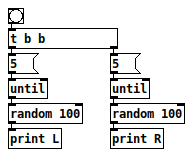@seb-harmonik.ar said:
The rationale is that the behavior of a patch SHOULD be completely reproducible if desired (and that's the intent).
@jameslo said:
How could you reproduce them (in order to study them) if the pseudo-random number sequence wasn't deterministic?
There might be exceptions, but in every pseudorandom number generator I've ever heard of, the sequence does repeat, provided that it's been seeded with a consistent value first.
SuperCollider seeds the random number generator at startup based on some value calculated from the system time. If you want replicable behavior, you do thisThread.randSeed = /* some value explicitly under your control */ at the moment of your choosing.
Pd [random] does implement a "seed xxx" message, so it isn't correct to suggest that Pd's constant initial seed is the way to get a replicable sequence. That's lucky if that's what you want, but it isn't necessary, and it may not be ideal either.
The problem with the counterargument here is that the [random] behavior depends on factors outside the user's direct control. If you really want a replicable sequence, the way to be certain of that is to send a "seed xxx" message to the random number generator at a moment that is under your control. Otherwise, you have no control over other components that might be pinging the random number generator. (Suppose, for instance, your patch depends on an abstraction which pings a [random] from a [loadbang]. Then, later, the abstraction author thinks, no, I shouldn't do that, I should get that first random value only on demand. Then you move your patch to another machine, re-download the abstraction from its source, and bang the behavior is different.) edit: that's a bad example, never mind.
Viewed from that perspective, one could say that the current Pd behavior misled the OP to believe that it wouldn't be necessary or desirable to control the seed... and then something changed somewhere in the system. That's actually quite a bad situation -- OP relied on happenstance for a mission-critical sequence of notes, and it isn't clear how to recover the original behavior.
Now this part is interesting, from whale-av: "There seems to be a shift......... the 2nd 3rd 4th etc. created are the same as the 1st 2nd 3rd etc. used to be." One possible explanation could be that, in the old version, something was consuming one random value before the user patch did (so the user patch never saw the true first value) -- so in the old system, the "first" random value would have been the second to be generated. Then, in the later case, the first value to be seen is the real first value. (But that might be -- or, is probably -- something in the test scenario and not in Pd itself.)
hjh





